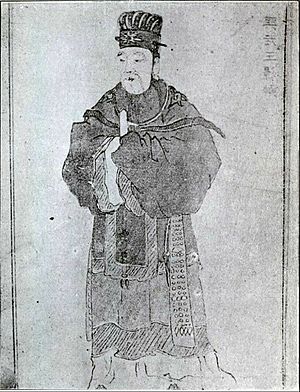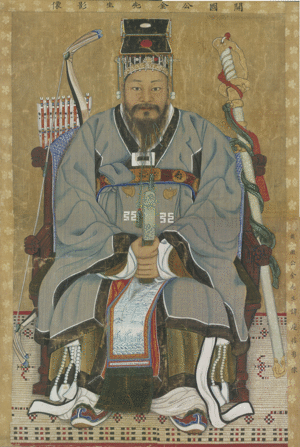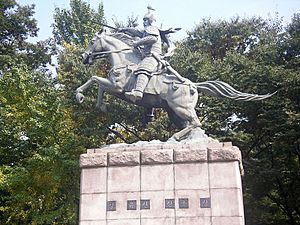Kim Yu-sin facts for kids
Quick facts for kids
Kim Yushin
|
|
|---|---|

Portrait of Kim Yu-sin in the "famous portrait photo book of Joseon" published in 1926
|
|
| Born | 595 |
| Died | 21 August 673 |
| Burial place | Gyeongju, South Korea |
| Other names | King Heungmu |
| Spouse(s) | Lady Jiso |
| Children | 10, including Kim Won-sul |
| Korean name | |
| Hangul |
김유신
|
| Hanja | |
| Revised Romanization | Gim Yu-sin |
| McCune–Reischauer | Kim Yu-sin |
Kim Yu-sin (born in 595, died August 21, 673) was a famous Korean general and leader. He lived in the 7th century during the Silla kingdom. Kim Yu-sin played a huge role in uniting the Korean Peninsula. He helped Silla bring together the different kingdoms under one rule.
He served under King Muyeol and King Munmu. Kim Yu-sin was said to be the great-grandchild of King Guhae of Geumgwan Gaya. This king was the last ruler of the Geumgwan Gaya state. Being from such an important family gave Kim Yu-sin a high rank in Silla society. This rank system was called the bone rank system. It decided a person's social and military standing. Most of what we know about Kim Yu-sin comes from old Korean history books. These include the Samguk Sagi and the Samguk Yusa.
Contents
Becoming a Great Warrior
Kim Yu-sin was born in 595 in a place called Manno county. Today, this area is known as Jincheon County in South Korea. His father was General Kim Seohyeon. His mother was Lady Manmyeong. She was related to King Jinheung.
Kim Yu-sin started training as a Hwarang warrior when he was just 15 years old. Hwarang were elite youth groups in Silla. They trained in military skills and spiritual practices. By the age of 18, he was already a skilled swordsman. He even became a Gukseon, which means a Hwarang leader.
By 629, when he was 34, Kim Yu-sin was given full control of Silla's army. Three years later, his cousin, Princess Deokman, became Queen Seondeok. She kept Kim Yu-sin as the main commander of the royal army. During Queen Seondeok's rule (632–647), Kim Yu-sin became very powerful. He had many private soldiers. He also won many battles against the neighboring kingdom of Baekje.
Kim Yu-sin's Military Victories
Kim Yu-sin's first big battle as a commander was around 629 AD. He quickly showed how skilled he was as a warrior. Silla was always fighting with its western neighbor, Baekje, over land. Both sides won and lost territory over many years. During this time, Kim Yu-sin became a general. He was a very good leader on the battlefield.
At one point, Baekje and Silla had teamed up. They wanted to fight against Goguryeo, a powerful kingdom to the north. Together, they attacked Goguryeo and won. Silla took the northern land, and Baekje took the southern land. But then, Silla broke the alliance. Silla attacked Baekje to take all the land for itself. After this, Baekje became allies with Goguryeo.
In 655, Goguryeo and Baekje attacked Silla. Silla then joined forces with Tang dynasty China to fight back. Kim Yu-sin was definitely leading the Silla forces by this time. In 660, Kim Yu-sin's Silla army, with 50,000 soldiers, joined with 130,000 Tang forces. They attacked the Baekje capital, Sabi, in a battle called the Battle of Hwangsanbeol.
The Baekje army was led by General Gyebaek. But Baekje only had about 5,000 soldiers. They were no match for Kim Yu-sin's army, which was ten times bigger. Baekje was already having problems inside its government. So, it quickly fell apart.
Kim Yu-sin's Silla forces and their Tang allies then moved on to Goguryeo. In 661, they attacked the strong Goguryeo kingdom. They were pushed back at first. However, the attack had made Goguryeo weaker. In 667, another attack was launched. This attack finally destroyed Goguryeo in 668.
Silla still had to deal with small groups of fighters. But their main goal was to make sure their Tang allies left the peninsula. After some tough fights in the Silla-Tang War, Silla forced the Tang troops out. This finally united the Korean Peninsula under Silla's rule.
Amazing Legends About Kim Yu-sin
Many exciting stories and legends are told about Kim Yu-sin. One famous legend says that Kim was once trying to stop a rebel army. But his soldiers refused to fight. They had seen a large star fall from the sky. They thought this was a bad sign. To make his troops brave again, the General used a large kite. He sent a fire ball up into the sky with the kite. The soldiers saw the "star" return to heaven. They felt brave again and defeated the rebels. Other stories say that General Kim used kites to send messages. He would communicate between his troops when they were separated by islands and the mainland.
Kim Yu-sin's Later Life and Legacy
Throughout his life, Kim Yu-sin believed that Baekje, Goguryeo, and Silla should be one country. He is seen as the main person who helped unite the Korean Peninsula. He is the most famous general from the unification wars of the Three Kingdoms.
Kim Yu-sin was greatly rewarded for his efforts. In 668, King Munmu gave him the special title of Taedaegakgan. This was like a "Supreme Herald of Defense." He also received a village with over 500 households. In 669, he was given about 142 separate horse farms across the kingdom. He died four years later, leaving behind ten children.
Kim Yu-sin lived to be 79 years old. He is known as one of the greatest generals and masters of Korean swords in Korean history. Many stories and legends are about him. Most Koreans learn about him from a very young age. After he died on August 21, 673, General Kim was given the special title of King Heungmu. He was buried near Gyeongju in southeastern Korea. His tomb is as grand as those of kings.
Kim Yu-sin's Family
Kim Yu-sin had two sisters, Kim Bo-hee and Kim Mun-hee. Kim Mun-hee later became Queen Munmyeong. She married Yu-sin's friend, Kim Cheon-chu. He became King Taejong Muyeol of Silla. King Muyeol is given credit for leading the unification of Korea under Silla. Muyeol and Munmyeong were the parents of King Munmu of Silla.
Kim Yu-sin's third wife was Lady Jiso. She was the third daughter of King Muyeol of Silla. Yu-sin had ten children. His second son, Kim Won-sul, later helped Silla become fully independent from the Tang dynasty.
Images for kids
See also
 In Spanish: Kim Yushin para niños
In Spanish: Kim Yushin para niños




